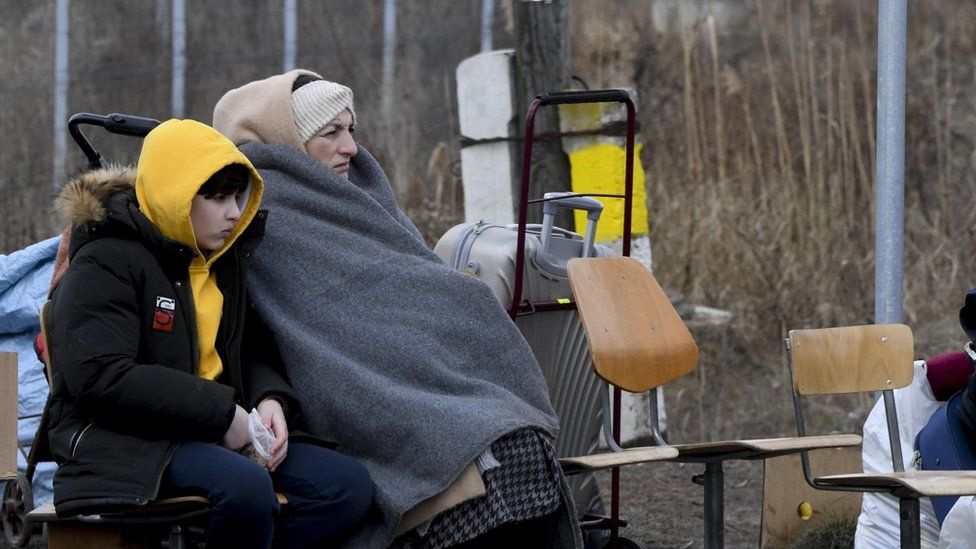Ukraine war: UK considers widening visa access for refugees
 Image source, EPA
Image source, EPAThe UK is examining widening access to visas for Ukrainian refugees, after criticism that existing routes are too restrictive.
Home Office sources said they are in the early stages of exploring a scheme to provide humanitarian access to people fleeing the conflict.
This would be on top of schemes for people with family in the UK, or whose applications are sponsored.
Only 50 Ukrainians with UK family links have obtained visas since war began.
A senior government source told the BBC that the government's focus is the two schemes for Ukrainian refugees that have already been announced but the need for further action is being kept under review.
Europe Minister James Cleverly defended the government's record so far, saying visa processes for refugees had only been set up "very recently".
More than 1.7 million people have fled Ukraine since Russia began an invasion last month, according to the United Nations.
Most are in neighbouring countries - with the Polish border agency saying on Monday that more than a million people have now crossed into Poland.
The UK has steadily increased its visa offer to refugees - but has faced criticism that its scheme is less generous than the European Union's.
A new application route for refugees was first reported by The Sun, which said Home Secretary Priti Patel wanted to relax current visa rules.
She told the newspaper she was "investigating the legal options" to create a humanitarian route for those seeking refuge from the conflict.
Currently, visas are being offered to relatives of Ukrainian people settled in the UK - with the range of family members eligible widened last week.
The Home Office has also previously announced a second route for refugees whose visa applications are sponsored by organisations, firms and councils.
A third route could significantly widen which Ukrainians can apply for sanctuary - although no details have yet been officially confirmed.


The home secretary told The Sun that she was considering a new route for refugees to come to the UK from Ukraine.
The first problem was that her comments weren't entirely clear.
The second problem is that neither Downing Street nor the Foreign Office knew what she was doing.
Hence why earlier, Foreign Office Minister James Cleverly was denying on television and radio that this was on the cards - instead reiterating the two routes that have already been announced.
The most charitable explanation for this is that Priti Patel was moved by a recent visit to the region, decided something had to be done and done quickly, so announced something before any detailed policy work had been done.
A less generous version is that it's the fog of war in Whitehall, which can be just as intense as it is on the battlefield.

On Sunday, the Home Office said "around 50" Ukrainians had so far been granted visas under the scheme for those with family links - about 1% of the 5,535 people who have applied since the programme launched on Friday.
The department added that 11,750 had begun applications online as of 10:00 GMT on Sunday, while 5,535 had completed them and 2,368 had booked a visa appointment to submit their application and biometric information.
Speaking on Monday, Mr Cleverly said he did not know exactly how many people had applied under existing routes, but numbers would increase "very quickly".
"We will seek to be generous in hosting Ukrainians - both those that have family here, and those that don't," he told BBC Radio 4's Today programme.
He added that there were neither "targets not limits" to the number of Ukrainians who could be allowed to come to the UK.
Speaking to BBC Breakfast, he added the UK was also providing humanitarian support to countries bordering Ukraine - adding this is where most refugees currently are and "that's where they want to stay".
'Lack of humanity'
France's Interior Minister Gerald Darmanin wrote to Ms Patel on Saturday, saying that 400 Ukrainian refugees had arrived at Calais to cross the Channel, but 150 were sent back and told to obtain UK visas at embassies in Paris or Brussels.
Mr Darmanin said the response to people in distress was "completely unsuitable" and showed a "lack of humanity", calling for the UK to put consular staff at Calais to help Ukrainian refugees cross.
But Ms Patel said it was "wrong to say we are turning people back" and said the Home Office already had people working in Calais to support Ukrainian families.
Vadym Prystaiko, Ukraine's ambassador to the UK, said the UK was at the "forefront of the effort" to support Ukraine - but the "maximum" number needed to be admitted.
He added that the visa process could be simplified, adding that any issues could be resolved later.
He said any "bureaucratic nonsense" should be cleared away, although he said it was necessary to continue security checks.



No comments